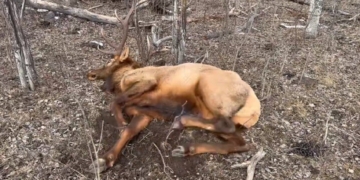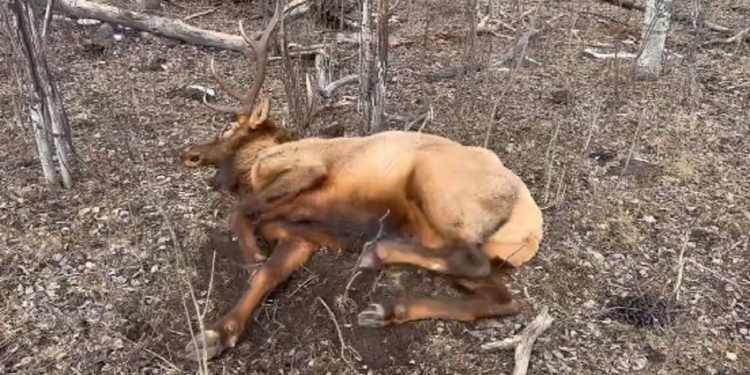A wildlife aficionado on social media delivered a serious lesson that outdoors enthusiasts and hunters need to take to heart if they want to be good stewards of the land.
The X social media account LaurenInTheWild, which posts about farming, wildlife, and the outdoors in Montana, recently published posts about finding a bull elk in distress, and what was discovered as the reason for the animal’s troubles is something all hunters and people who love the outdoors need to heed.
“This one is a bit hard on the heart, so trigger warning I guess,” the writer stated above a short video showing the dying elk on the ground, kicking piteously as it faced its final hours of life.
“Bit of an odd day,” the writer continued. “Our ranch hand was checking fences and found our resident bull elk down by the creek, unable to rise. He’s been living here for a couple months with a small group of ladies, and seemed content. He had a very slight limp, but otherwise seemed like a normal young bull.”
This one is a bit hard on the heart, so trigger warning I guess.
Bit of an odd day. Our ranch hand was checking fences and found our resident bull elk down by the creek, unable to rise. He’s been living here for a couple months with a small group of ladies, and seemed content.… pic.twitter.com/qpmUJeIUu8
— Bull Respecter (@LaurenInTheWild) March 9, 2024
LaurenInTheWild noted that they next called Montana Fish, Wildlife & Parks to see if they should euthanize the struggling animal, but the officials told them to wait until a department biologist arrived on scene to make sure there were no dangerous diseases to worry about, such as Chronic Wasting Disease.
“Of course, CWD is the big fear. It’s a prion disease that causes emaciation and neurological issues. CWD is very contagious, between ungulates. Deer, elk, moose, caribou. It’s basically mad cow for wild deer species,” LaurenInTheWild wrote.
CWD has become an increasing worry across the country for wildlife. CWD is a fatal disease that affects the brain, spinal cord, and many other tissues of farmed and free-ranging deer, elk, and moose.
“The Biologist shows up, we scratch chins and assess the poor guy. Definitely a situation that warrants euthanasia, but WHY?” LaurenInTheWild wrote.
The biologist decided that the elk should be put down, but after the deed was done, they set about to figure out why the elk was dying.
“First thing we notice is that this elk is EMACIATED. Like, probably sitting at about 50% of the weight he should be. 400# maybe, and he should be 800#,” LaurenInTheWild wrote.
So, the Biologist puts the elk down, and he and I glove up and commence a necropsy to assess the bull, look for clues, take tissue samples, etc.
First thing we notice is that this elk is EMACIATED. Like, probably sitting at about 50% of the weight he should be. 400# maybe, and… pic.twitter.com/EgXH1AZE4B
— Bull Respecter (@LaurenInTheWild) March 9, 2024
Are you a hunter?
To trace down the causes of the elk’s health issues, they started skinning the animal. Nothing was obviously wrong. They checked the jaw, teeth, lymph nodes, and searched the carcass from head to haunches and found nothing obvious amiss.
When they got to the animal’s right hip, though, they finally began to see a problem. There was a lump the size of a grapefruit on the animal’s thigh.
“We cut into that lump, and find that his femur is basically *gone*. Where the femur should be, there is a big ball of marrow and bone shards encased in a hard, calcified matrix of scar tissue. The femur head is floating around loose outside of the hip socket,” LaurenInTheWild noted.
They cut deeper into the mass.
“Out of the middle of this mess pops a green polymer tip and fragments of a 5.56 round,” LaurenInTheWild wrote, with obvious disgust.
“This elk had been walking around for months, with a limp that looked like a mild sprain, with his entire right femur blown apart by some dips***t with bad aim and an underpowered rifle,” Lauren concluded.
The animal had been hit by someone who was evidently neither a good shot — one does not shoot for the rear of an elk, all that does is cause needless suffering — nor understood what the ammunition being used was capable of doing.
While Montana does not restrict firearms calibers for elk hunting, other states with the big-game animals, such as Arkansas and Colorado, set a minimum caliber of 6mm. A smaller and lighter bullet, the 5.56 round only delivers a fraction of the energy on-target as a heavier cartridge would. On an elk that can weigh up to 700 pounds, anything but a direct hit on vitals with a light round would likely only cause suffering and injury for the animal.
Anyone who doesn’t understand an issue like that doesn’t deserve to be around wildlife.
The animal’s tissues have been sent off for analysis to determine if it was infected by CWD.
Still, LaurenInTheWild railed against whoever caused this animal to suffer, and wrote, “Sometimes, stewardship of the land brings you face to face with both the consequences of human stupidity, and the breathtaking resilience of nature.”
Rest easy, big buddy. You deserved so much more. We’re going to miss your noble presence here on the ranch. pic.twitter.com/JgIIVOJCUv
— Bull Respecter (@LaurenInTheWild) March 9, 2024
The lesson is clear. If you are going to be a hunter, don’t play at it. Learn what you need to know before pulling that trigger. Be a good steward of the land. Not someone who wantonly destroys and causes needless suffering.
This article appeared originally on The Western Journal.


























 Continue with Google
Continue with Google